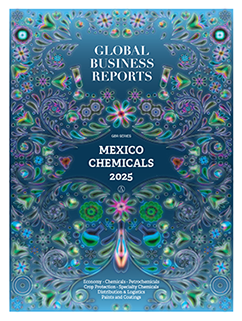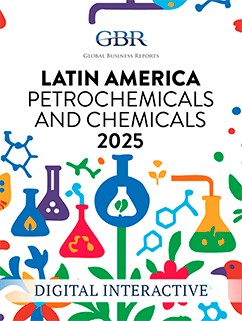
"This new government has the potential to foster growth and innovation within the industry, especially if it focuses on facilitating international trade and addressing logistical challenges."
RELATED PUBLICATION
ARTICLES FROM THIS PUBLICATION
Maggie Gómez-Rábago
MANAGING DIRECTOR, CHARLOTTE CHEMICAL
Can you tell us about the past year at Charlotte Chemical?
The past year marked the fifth consecutive year of sustained growth in sales and profits for our company. It has also been a year full of challenges, but one major accomplishment was consolidating the implementation of an enterprise resource planning (ERP) system. This has professionalized our team further, enabling better analysis, clearer information, and more actionable insights through the ERP's data and alerts. Although the process took three challenging years, it has significantly improved our efficiency and decision-making. Our focus remains on sustaining growth by maintaining high service levels and consistently delivering value to our clients.
2024's significant step was establishing a Strategic Sourcing department, which includes marketing and market intelligence. This allows us to understand better market trends, price movements, and availability issues, many of which are impacted by global geopolitical dynamics. To address these issues, we have prioritized securing alternative, more sustainable solutions that lower costs, reduce carbon footprints, and minimize health impacts. We have seen particular success in flame retardants, offering clients eco-friendly and more cost-effective options alongside traditional products.
What progress has been made on your goals to expand in the plastics industry?
In plastics, our focus has been on flame retardants, both traditional and newer, more sustainable solutions. While we have grown our market share, there is still significant room for expansion. Internationally, we have sourced sustainable, low-VOC, and natural-origin products that substitute petroleum-based solutions. These products meet or exceed performance standards while reducing environmental impact. For example, we have introduced a low-VOC coalescing agent based on citric acid that benefits the environment and provides economic advantages by reducing waste.
Sustainability does not always equate to higher costs. While the local Mexican market often prioritizes price, the global market increasingly values sustainability. For instance, products with lower carbon footprints can sell more quickly in markets like Germany, even if they are slightly more expensive. Nearshoring and export opportunities also play a role. Mexican manufacturers focus more on external markets, where buyers appreciate sustainable, high-quality products.
What challenges has the chemical industry faced in the past year?
The industry has faced geopolitical pressures, rising raw material costs, and logistical challenges. However, we have adapted by focusing on market intelligence, strategic sourcing, and sustainability. Tariff threats from the US are a potential headwind. If tariffs are imposed on Mexico or Canada, the added costs will likely impact American consumers through increased logistics costs or tariffs. This would lead to less consumer spending due to higher prices. Much of the rhetoric is for negotiation purposes, and Mexico is better prepared to negotiate firmly. Mexico's free trade agreements with 48 countries also open vast opportunities to explore other economies. Diversifying our focus can yield significant results even in markets often overlooked by others.
I feel optimistic about the new administration under Claudia Sheinbaum's leadership. She is a highly educated, scientifically minded individual who understands high-tech concepts. This shift gives me hope for improved dialogue and collaboration with the government, lacking in the previous administration. The chemical industry is critical for Mexico's economic strength, supporting numerous industries and creating substantial direct and indirect employment. This new government has the potential to foster growth and innovation within the industry, especially if it focuses on facilitating international trade and addressing logistical challenges.
How is Charlotte Chemical using new technologies to improve processes?
Our ERP system implementation took two years, and we were determined to complete it in 2024 to avoid further delays. We identified opportunities that might have been overlooked by teams working within routine processes. For instance, we automated data entry for import processes using AI, eliminating manual input tasks like entering customs declaration details. This ERP system has enabled numerous advancements, including alerts for unmoving or soon-to-expire products, notifications for cost fluctuations, and tools for better decision-making. It has also integrated human capital management, improving connectivity across our operations. Being directly involved in the implementation process was also critical, as it helped uncover hidden opportunities for improvement. Our ERP system has become a strong foundation for further enhancements.











